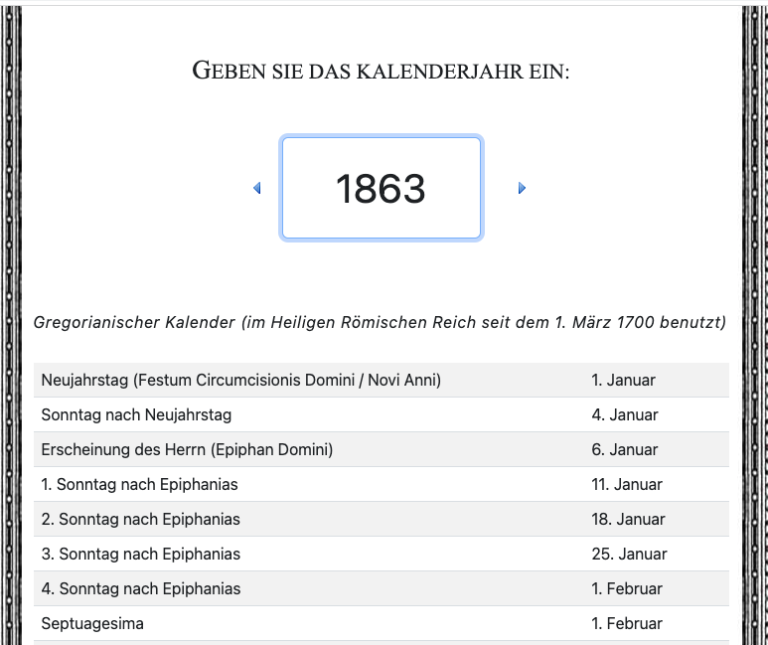Septuagesimae? Kantate? When I came across such words in German church records, I was stumped. What could these obscure words mean? After a great deal of research, I found that they were certain Sundays in the church’s liturgical year. These names for certain Sundays and other various feast days are frequently used in church records to indicate days of birth, baptism, marriage banns, marriages, deaths, and burials. So rather than writing that your ancestor was born on February 4th, you may see his date of birth listed as the 4th Sunday after Epiphany – 4. Sonntag nach Epiphanius. Yikes!
To figure out which church holidays fell on which date during a certain year, see: https://kirchenkalender.com/. Type the year in the field “Geben Sie das Kalenderjahr ein”, and you will find out the date. I’ve also compiled a list of feast days (German) below, with their English translation. Have you come across any of these before?
Things to keep in mind:
- If you see a number with a period after it (2. September), that is a sign that it is an ordinal number (first, second, third, etc.) You may also see a “-te” or “-ten” after a number to represent the same thing (2te September)
- Sonntag = Sunday
Advent
Advent – Advent
First Sunday in Advent (first Sunday after November 30) – erster Adventssonntag; erster Sonntag im Advent; 1. Advent
Second Sunday in Advent – zweiter Adventssonntag; zweiter Sonntag im Advent; 2. Advent
Third Sunday in Advent – dritter Adventssonntag; dritter Sonntag im Advent; 3. Advent
Fourth Sunday in Advent – vierter Adventssonntag; vierter Sonntag im Advent; 4. Advent
Christmas Eve (December 24) – Heiliger Abend
Christmas (December 25) – Weihnachten
Post-Epiphany (Ordinary Time)
Epiphany (January 6) – Epiphanias, Erscheinung Christi, Dreikönigstag, Dreikönigsfest
Septuagesima Sunday (nine weeks before Easter) – Septuagesimae
Sexagesima Sunday (eight weeks before Easter) – Sexagesimae
Quinquagesima Sunday (seven weeks before Easter) – Quinquagesimae
Lent
Lent (40 days before Easter) – Fastenzeit
Ash Wednesday (first day of Lent) – Aschermittwoch
Invocavit (six weeks before Easter) – Invocavit; Invocabit; 1. Fastensonntag; 1. Sonntag der Passionzeit
Reminscere (five weeks before Easter) – Reminscere; 2. Fastensonntag; 2. Sonntag der Passionzeit
Oculi (four weeks before Easter) – Oculi; 3. Fastensonntag; 3. Sonntag der Passionzeit
Laetare (three weeks before Easter) – Laetare; 4. Fastensonntag; 4. Sonntag der Passionzeit
Judica, Passion Sunday (two weeks before Easter) – Judica; Passionsonntag; 5. Fastensonntag; 5. Sonntag der Passionzeit
Palm Sunday (one week before Easter) – Palmsonntag; Palmarum; 6. Sonntag der Passionzeit
Holy Thursday (Thursday before Easter) – Gründonnerstag
Good Friday (Friday before Easter) – Karfreitag
Easter
Easter – Ostern
Quasi Modo Geniti (one week after Easter) – Quasimodogeniti; Weißer Sonntag; 1. Sonntag nach Ostern; 2. Sonntag der Osterzeit
Misericordia (two weeks after Easter) – Misericordias Domini; 2. Sonntag nach Ostern; 3. Sonntag der Osterzeit
Jubilate (three weeks after Easter) – Jubilate; 3. Sonntag nach Ostern; 4. Sonntag der Osterzeit
Cantate (four weeks after Easter) – Kantate; 4. Sonntag nach Ostern; 5. Sonntag der Osterzeit
Rogate (five weeks after Easter) – Rogate; Vocem iucunditatis; 5. Sonntag nach Ostern; 6. Sonntag der Osterzeit
The Ascension (thirty-nine days after Easter) – Christi Himmelfahrt
Exaudi (six weeks after Easter, Sunday after Ascension) – Exaudi; 6. Sonntag nach Ostern; 7. Sonntag der Osterzeit
Pentecost – Pfingsten
Ordinary Time
Trinity Sunday (first Sunday after Pentecost) – Trinitatis; Dreifaltigkeitssonntag
Assumption of Mary (August 15) – Maria Himmelfahrt
St. Michael’s Day, Michaelmas (September 29) – Michaelis
All Saint’s Day (November 1) – Allerheiligen
All Souls’ Day (November 2) – Allerseelen
There are also many feast days relating to certain saints. In this case, it is simply a matter of an easy Google search to check if the saint’s day matches up with the dates in your document. Happy transcribing!
Want more help with feast days? Check out our helpful book The Magic of German Church Records!

